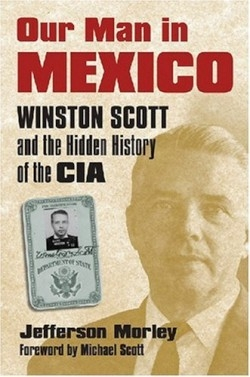Our Man in Mexico
Winston Scott and the Hidden History of the CIA
“If you had to pick a moment when it all began to rot,” says Michael Scott, whose father is the subject of this page-turning nonfiction thriller about the CIA in the fifties and sixties, “it might be Guatemala in 1954.” Improbably called “Operation Success,” the CIA ruined the democratically elected Jacobo Arbenz government and replaced it with one much more sympathetic to American interests. Newly installed President Castillo Armas fomented a civil war that led to 200,000 deaths. While Winston Scott, who became CIA Station Chief in Mexico, had no role in the regime change, he was involved in the Bay of Pigs fiasco, seven years later, which used “Operation Success” as its model.
Morley, formerly “World Opinion Roundup” columnist for washingtonpost.com, has written for the New York Review of Books, Slate, and Salon. The momentum for the book came in large measure from Michael Scott, who was determined to piece together his father’s story, a life spent mostly in the shadowy worlds of the CIA and its World War II predecessor, the Office of Strategic Services (OSS). The younger Scott spent years trying to get the CIA to release his father’s unpublished memoir, It Came to Pass, which Scott finally received in a redacted version.
Unlike his more famous intelligence operative contemporaries—Allen Dulles, James Angelton, and Richard Helms—who all figure prominently here, Scott (1909-1971) was not born into East Coast society but was raised in Alabama poverty and earned an appointment to the CIA following the war. Most of this intriguing book investigates Scott’s role in the Kennedy assassination while he headed the CIA in Mexico.
It Came to Pass reveals that contrary to the official CIA line and the Warren Commission conclusion, Lee Harvey Oswald was under constant surveillance by Scott and the Mexican CIA Station before Kennedy’s murder. Oswald, a one-time defector to the Soviet Union, was of great concern to Scott, and Oswald was photographed visiting the Soviet and Cuban embassies in Mexico, although the CIA in Washington denied that the photographs existed. Scott won plaudits for his work in the aftermath of the assassination because he did not challenge the official stance, but he was haunted by Kennedy’s death for the rest of his life.
Morley has written a fine biography of the enigmatic Scott and its flaw of too much CIA-speak, bureaucratic language, and acronyms for organizations and events is small indeed, when measured against the book’s often exciting telling of this little-known chapter in the national trauma that was the 1963 Kennedy assassination.
Disclosure: This article is not an endorsement, but a review. The publisher of this book provided free copies of the book to have their book reviewed by a professional reviewer. No fee was paid by the publisher for this review. Foreword Reviews only recommends books that we love. Foreword Magazine, Inc. is disclosing this in accordance with the Federal Trade Commission’s 16 CFR, Part 255.

